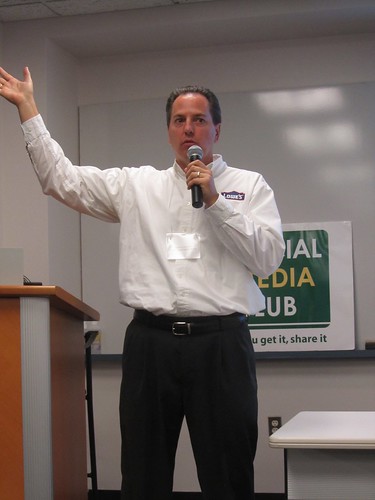My “Buzzword Radar” is oversensitive, honed over years in the PR profession, where the temptation to go the lazy route “”leading provider of robust, scalable solutions” was often too great (or driven by inexperienced managers and less sensitive clients) to resist. This is a great example of a web site from the 1st Internet bubble that had many PR pros- and most all media hacks- nodding in agreement at the same time they were burying their foreheads in their palms.
I’m a fan of plain speaking, and most of the gibberish I lay out is in the spirit of absurdist wordplay.
When people in my industry started plastering the word “social business” everywhere they could over the last several years, my buzz-dar went nuts. What could that term possibly mean? Sure, it’s two simple words put together that could have a simple explanation, but my instinct was to run far away.
However, I saw that organizations and people I trusted were latching on to “social business,” so either it had gained a respectable definition or it was simply too late. Being a cynic and a pessimist, I chose the predictable path at first.
In the past week I attended two events that referenced “Social Business” heavily. The first was the annual Society for New Communications Research (SNCR) Symposium, in a room filled with people whose intelligence I respect. I expressed my differing feelings on Twitter and got more smart responses.
From Hillary Boucher, what I dubbed an “elevator pitch:”
[blackbirdpie url=”https://twitter.com/#!/hillaryboucher/status/132115289121886208″]
From my friend Rachel Happe of The Community Roundtable:
[blackbirdpie url=”https://twitter.com/#!/rhappe/status/132159963425538049″]
Rachel’s longer definition lives here: http://www.informationweek.com/thebrainyard/news/229401355/social-business-requires-socialized-processes

Later, I attended the Social Media Club Boston chapter meeting where the subject was, you guessed it, “Social Business.” IBM, the host, has actually co-opted the term (defining a social business as one that has engagement, transparency and speed), meaning social business has either achieved legitimacy or been consigned to the big-time corporate buzzword dustbin.
It seems, for now, to be the former. One of the evening’s featured speakers, Andrew Carusone of Lowe’s, spoke with conviction about the company’s efforts to build a “social business” (not necessarily the phrase they use), from the inside out, and the successes they have had so far. I had the chance to speak with him beforehand, and wondered aloud whether “social business” is replacing “Enterprise 2.0” as the catchphrase. I suspect that’s a matter of semantics, as the “experts” on Quora can’t seem to decide either. Carusone himself had been happy with “E20” as late as last year so the I’m guessing any distinctions will be steamrolled by those not inclined to nuance.
Is “Social Business” a meaningless buzzword? It seems I can’t dismiss it. Don’t any of you all go around ruining it for everyone else. I mean it.